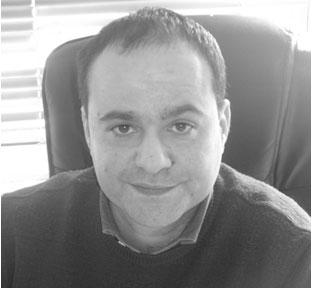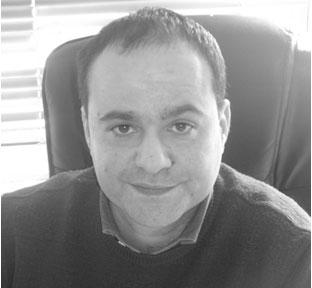
Interview with Costas Cristodoulides, Head of International Affairs of AKEL
30th of January 2015
Interview published at “Unzere Zeit” Newspaper (organ of the German Communist Party – DKP)
 UZ: Since the breakdown of the Cypriot banking sector in 2013, the population is suffering under the rigid austerity policy, which the government of president Anastasiadis is implementing at the behest of the European Commission and the IMF. How did the living conditions of the working people develop under this policy?
UZ: Since the breakdown of the Cypriot banking sector in 2013, the population is suffering under the rigid austerity policy, which the government of president Anastasiadis is implementing at the behest of the European Commission and the IMF. How did the living conditions of the working people develop under this policy?
First we have to note that the breakdown of the banking system was the outcome of its capital performance and speculation regarding Greek bonds and secondly of the EUROGROUP decisions as a result of political aspirations of preserving the main antipeople characteristics of the EU and particularly EMU and continuing the economic war against Russia and Russian economy. After the Memorandum implementation by the right wing government of Mr Anastasiades and the agreement with the Troika, 240,000 of Cypriots leave under poverty levels; unemployment has risen to 17%, and people income decreased by at least 20-30%. 7,000 small companies have gone bankrupt and if you compare these facts with the total population of Cyprus which is less than 850,000 one could have a decent view of what is going on. Most importantly, after the implementation of the Memorandum, Cyprus and its people have been deprived of political sovereignty, and the government keeps up with its manifesto that is exploiting the working people and serving big capital.
UZ: Is there resistance? Which steps does AKEL take as strongest opposition party?
The popular movement led by AKEL, is striving against the memorandum with the EU-IMF-ECB. There is a general understanding of the destructive consequences of the Memorandum but not enough resistance at the time beeing. The government after the agreement with the Troika submitted a bill to the Parliament regarding the confiscation of private property including housing of those that cannot perform with their loans to the banks. In other words people suffering because of the capitalist crisis, the policies of the EU and the government, unemployed etc have to pay the banks with their own house. AKEL and other political parties did not support this bill and a demonstration by trade unions and other actors demanded its withdrawl. At this moment the Parliament voted to postpone this bill and the struggle is on going. AKEL presented to the Parliament its own proposal for legislation allowing all those small firms and people to keep their housing conditions and professional entities. The social situation is deteriorating and the Government is proceeding with an assault against workers rights, extending working time and an assault against tertiary and secondary education students watering down social provisions. It also envisages an indirect sell off of public health through private insurance companies. Against this backround the Party is putting its efforts in organising already visible popular discontent into real resistance by a broad movement. At the same time AKEL promotes its own proposals of legislation in order to minimize the cost to the people.
Costas Cristodoulides:
UZ: Under the previous AKEL-lead government, there was a certain convergence with the violently separated northern part of Cyprus. It seems, that this development was lead to a dead end.
Costas Cristodoulides: The government of comrade Christofias took intensive steps in order to bring about good results into the bicommunal dialoque for a solution to the Cyprus problem. At a certain point when the leadership of the Turkish Cypriot community was in the hands of a progressive leader, Mr Talat, some relatively good results were produced. Unfortunatelly, this changed when a hardline leader came into power, Mr Eroglu. The Turkish Government and Mr Eroglu projected at that point a general position of intransigence. In practise they do not accept a federal model that encourages Cypriots, both Greek Cypriots and Turkish Cypriots to share power in a common state but give emphasis on completely divisive elements. Then came Turkish governments illegal directive through the Ministry of Foreign Affairs that binded certain areas within Cyprus Republic Exclusive Economic Zone in order to declare through a bulling attitude that hydrocarbonate reserves of the Republic are a matter of great interest for Turkey. This provoked the postponment of the intracommunal talks since it was a very hostile and provocative action that is questioning through military means the sovereignty of a state. We are now at a deadlock since it seems that Mr Erdogan remains hostile to a solution. This deadlock does not serve the real interests of the people. It serves the forces that for long plan the final division of the country in order to serve the interests of imperialist forces that envisage a general control over the whole Middle East and Southeastern Mediterrenean. AKEL keeps up with good relations with the progressive parts of the Turkish Cypriot society in order to break with the vicious cycle of occupation and division and to bring about a solution that reunites the country.
UZ: Does a real danger of a military dispute with Turkey exist, if we take in account the vicinity of Cyprus to Syria where Turkey plays a special role?
Costas Cristodoulides: The arrogant style of politics of Mr Erdogan is evident not only regarding the Cyprus issue but also in relation to the broader region: Turkey wants to incorporate a part of Syria, it fails to listen to the legitimate demands of the Kurdish people etc. This neo-ottoman attitude was encouraged by NATO and the USA. AKEL stands for a peaceful solution but the international community and particularily the UN has an important role to play. When a country like Turkey actively and in hostility disputes the sovereignty of another small state the UN has o take a responce that respects International Law. Our position is that energy reserves of the Republic will be for the benefit of the cypriot people in the framework of a future solution of the Cyprus problem. It should be another incentive for a solution that serves the interests of the people. But Turkey cannot hold development as a hostage of its expansionist policy. No one can predict how things may evolve that is why a solution is neccessary.
UZ: Like our party, AKEL has an observer status in the Party of the European Left. Which advantages and which disadvantages has the ELP construction? Why do you not apply a full membership?
Costas Cristodoulides: Our position is that the Party of the European Left is not the outcome of a unitary process between the class based left, Communist, Workers and radical oriented parties. We deeply believe, and this is the reason we are not full members, to the cause of unity of these parties under a common strategic aspiration. But we respect all parties of the left and we coperate with many especialy at the level of GUE/NGL. We think that in the face of the vicious international capitalist assault, Communist parties and progressive structures that serve working class must cooperate at the best possible manner. AKEL, highlights the neccessity for an understanding of differences among same type of parties, respect and finding a minimum of common language in order to resist imperialist plans and give a joint if possible response against the background of increasing exploitation of workers by big capital and their political personel.




